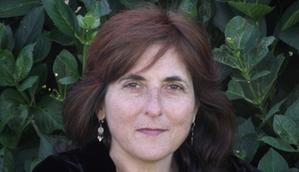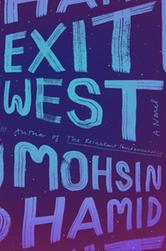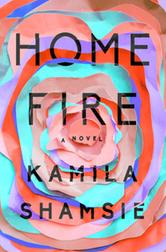
|
|
| Rebecca Saletan (photo: Louie Saletan) |
|
Rebecca Saletan is vice-president and editorial director of Riverhead Books, a division of Penguin. During her career, Saletan has acquired and edited a range of award-winning, bestselling writers.
Two of her books are on this year's Man Booker long list: Exit West by Mohsin Hamid and Home Fire by Kamila Shamsie. Both authors are originally from Pakistan and their books address, in unusual ways, the immigrant experience.
What drew you to these two authors and these books in particular?
I have published Mohsin from the very beginning of his literary career, with Moth Smoke. What drew me to Mohsin's work and what continues to hold my interest is his refusal to let his characters and the places he comes from be stereotyped as well as his uncanny sense of where the world is headed. His eye is always just over the horizon. Exit West--a love story about a couple who are forced to migrate from their homeland--was conceived a few years ago, yet it foresaw exactly where we are today as we confront a world of people in flux.
I followed Kamila from afar and joined Harcourt just at the end of the time that she was being published there. I am not an editor who cares primarily about plot--I generally read for voice first, character second and plot third. Home Fire, about the struggle of three British-Pakistani adult siblings to save their family when one goes astray, has an incredible, page-turning plot--but what struck me most is the incredible sympathy with which Kamila allows us to inhabit each of her characters in turn as the story moves forward. Even the shrewd politician, who in other hands might have been a stock figure--we understand what he feels for his son and why he acts as he does.
|
|||

|
|||
Did you need to learn more about Pakistan to understand Exit West and Home Fire fully?
Having published Mohsin for so long, it has made me more alert to news from that part of the world, not just headlines calculated for alarm. In general, what speaks to me are books that don't hold my hand too much. I like the excitement that comes with being thrown into a story with the expectation that I'll be able to swim. Both of these authors do that--having lived in the U.S. and U.K. in addition to Pakistan, they have developed a cultural bilingualism that allows them to take us swiftly into other perspectives.
Clearly you derive much pleasure in working with Mohsin and Kamila. Were there any challenges in the process of editing their books?
I joke with Mohsin that I have learned to be a lighter and lighter editor with him the longer we've worked together. He acknowledged that, but he pointed to three distinct contributions I made to Exit West, the most important of which was forcing him to come up with a different title--the original wasn't strong--and then editing Two Exit West to simply Exit West.
Home Fire was my first time editing Kamila. The vast majority of the work was in the first third of the book. The emotional dynamics between the three siblings needed sharpening and clarification, so I got to ask Kamila a lot of questions and make some suggestions to that end. The results were incredibly rewarding--the whole first section rounded beautifully into form and perfectly set up all the tragedy that follows. As with Mohsin, I worked in tandem with Kamila's tremendous U.K. editorial team at Bloomsbury, where all of her books have been published.
To what extent are Mohsin and Kamila Pakistani authors as opposed to authors who happen to be Pakistani, or is there no difference?
Riverhead is not blind to ethnicity and nationality--and we certainly want to be publishing authors who bring different perspectives and unheard stories that seem urgent in our times. But we don't pigeonhole our authors by their origins. In fact, one of the challenges of publishing writers from diverse backgrounds is that sometimes, even in the course of well-meaning and laudatory coverage, they get treated as though they are journalists reporting on their respective countries. We have learned to prepare such authors to steer conversations back to talking about their work as novelists, not as representatives of their religion or ethnicity or nationality.
_Zain_Mustafa_.jpg)
|
|
| Kamila Shamsie (photo: Zain Mustafa) | |
What do Exit West and Home Fire have to say that is particularly relevant to our time?
Exit West captures how deeply the world is in motion right now. As Mohsin has written, even if you stay in one place your whole life, that place will have changed utterly: space is transformed by time, and the pace of flux has accelerated. He does not focus on the journey itself--his characters move sort of magically through doors that are not entirely unlike our own near-instantaneous travel by airplane or Skype--but instead on the before and after of the journey. He doesn't just depict this, or the fear and anger this new mobility generates. He sees it as his role to imagine a benign and plausible future under these circumstances, and in this he has left his mark on the novel itself as a creative form, a rare thing.
In Home Fire, Kamila touches on somewhat similar themes from a very different direction. A teenager goes astray, and suddenly a family who have lived in one place all their lives are being treated as "other," as though they don't belong. Kamila makes us think more carefully about what a terrorist is, and how indiscriminately we use the word.
 Have Exit West and Home Fire had an impact on your knowledge and understanding of Islam?
Have Exit West and Home Fire had an impact on your knowledge and understanding of Islam?
Working with these authors and others has definitely made me more attentive to Islam and the varieties of experience that fall under it. I edit Lesley Hazelton, whose book After the Prophet chronicles the origins of the Sunni-Shia split, and whose The First Muslim, a biography of Mohammed, is widely respected by Muslims and non-Muslims alike. And writers like Mohsin and Kamila have made me more alert to how reductive we can be in our thinking about people of other faiths. As an almost entirely nonobservant Jew with Reconstructionist parents and an Orthodox uncle, I nevertheless harbor a deep sentimental attachment to Passover and the occasional Shabbat dinner. Even among my almost entirely Christian friends growing up in the Texas Bible Belt, I witnessed a tremendous spectrum of religious belief and practice. So it makes sense that the same range exists among Muslims, yet we talk as though all Muslims practice a single (intolerant, repressive) form of the religion when logically we should know that the same spectrum exists for them.
Can you share with us a few books you are currently editing that you are particularly excited about?
My list is and over time has grown more and more international, in both the fiction and nonfiction that I edit. I am excited about the upcoming release of Russian American journalist Masha Gessen's The Future Is History: How Totalitarianism Reclaimed Russia, a sort of nonfiction War and Peace in which Gessen follows several Russians born in the 1980s against the backdrop of their country as it devolves over three decades into a mafia state. I am also excited about Francisco Cantu's The Line Becomes a River, a memoir by a former U.S. Border Patrol officer who worked along the Mexico border for several years. It's a powerful and unusual book that works as much on the heart as on the mind. --Shahina Piyarali, writer and reviewer


_Jillian_Edelstein.jpg)